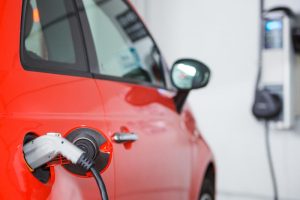On September 1, a bill that helps businesses build a better, brighter future for electric vehicles in Texas will become state law.
SB 1202, makes it possible for companies or individuals that own or operate equipment used solely for electric vehicle charging services to avoid being regulated as electric utilities or electric retail providers.
The Texas Utilities Code requires electric utilities to provide continuous and reliable electricity service on a non-discriminatory and transparent basis. In a January 2021 report to the Texas Legislature, the Public Utility Commission of Texas explained that these safeguards protect customers at their homes and businesses, where uninterrupted electric service preserves lives and livelihoods.
Electric vehicle charging stations are different. EV owners are not reliant on any particular stand-alone charging station; they use any given charging station and have no further relationship with it after they depart. Any regulatory framework for charging stations should be tailored to what Texas regulators and drivers want from the nascent charging marketplace.
Because of EV charging stations’ need for a different regulatory approach, the PUCT recommended that the Texas Legislature clarify that the use of a charging station is not a transaction governed by existing retail electric policies and that EV charging stations are not electric utilities or retail electric providers. In the place of comprehensive utility regulations, the PUCT observed, the EV charging station marketplace might benefit in the future from a different set of regulations that included some consumer protections without the full panoply of obligations that encumber utilities.
Bipartisan Texas law smooths the path toward a more vibrant EV market Click To TweetThis new law comes as many leading companies are investing in the Texas EV market. For example, the Tesla Gigafactory in Austin is nearing completion and will soon begin assembling electric passenger vehicles, including the Model Y electric SUV, while the EV startup company Rivian Automotive is considering Fort Worth as the site of a $5 billion dollar factory to manufacture 200,000 EVs a year. SB 1202 will complement these broader EV initiatives by supporting a growing electric transportation network in Texas and beyond.
But what does this mean for Texans?
The new law will help ease Texas EV owners’ worries about long distance travel — one of the most common barriers to EV ownership. Without the possibility of utility-style regulation, EV charging companies can now develop charging stations more quickly and extensively.
Removing barriers for EV adoption and charging can also have a long-term impact on the state’s back up power capacity. It is no secret that Texans are skeptical about electricity reliability. Fortunately, EV battery technology can be powerful enough to provide electricity to a house during a blackout. The forthcoming Ford F-150 can provide life-saving power for a home for as long as three days. As the EV market matures, more models will offer similar capabilities.
The Legislature’s passage of SB 1202 is a prime example of positive, bipartisan solutions. Broad support for the bill shows how clean energy initiatives can succeed when consumers, businesses and the environment align.
PUCT must ensure that the benefits from SB 1202 happen.
As SB 1202 becomes law, the ball will be back in the PUCT’s court, where it must prioritize policies that ensure charging station development flourishes broadly across Texas. For example, regulators can encourage resiliency and contain system costs by incentivizing charging station owners to co-locate solar generation and battery storage with their charging equipment. It can also require charging providers to adhere to emerging technology and communications standards that ensure Texans have a consistent charging experience at any new charging station and that equipment is interoperable and does not become stranded.
Additionally, the PUCT must take steps to make sure charging stations are developed in every corner of the state, allowing EV drivers to travel with confidence. State-wide charging access, including in rural areas, is crucial to building a successful market in a large state like Texas. A regulatory framework that protects consumers while allowing competition to flourish will give Texas a shot at achieving a big, bright and clean transportation future.
